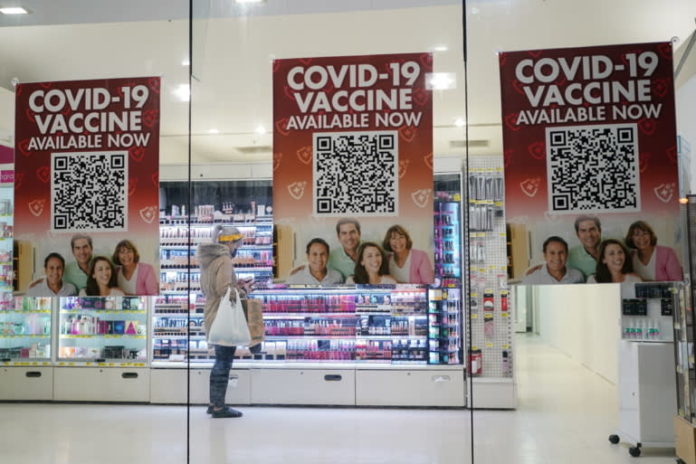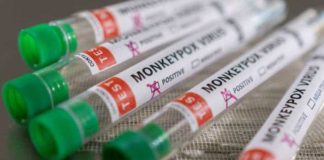Nikkei Asia is tracking the spread of the coronavirus that was first detected in the central Chinese city of Wuhan.
Cumulative global cases have reached 225,739,425, according to Johns Hopkins University in Baltimore. The worldwide death toll has hit 4,647,735.
For more information about the spread of COVID-19 and vaccination progress around the world, please see our interactive charts and maps.
— Global coronavirus tracker charts
— Status of vaccinations around the world
— World map of spreading mutated strains
— Distribution, duration, safety: challenges emerge in vaccine race
—-
Wednesday, Sept. 15 (Tokyo time)
2:07 p.m. Secondary school students in Cambodia’s capital Phnom Penh returns to classrooms. For the first time since February, many of the almost 140,000 pupils in the city sat for in-person lessons at both public and private schools that had been certified as safe by the Ministry for Education. All teachers and school staff were required to take rapid COVID-19 tests prior to returning to campuses.
1:44 p.m. India reports 27,176 new infections in the last 24 hours, up from 25,404 the previous day but marking the fourth straight day with less than 30,000 cases, pushing the country’s total to 33.32 million. Deaths rose by 284 to 443,497.
12:41 p.m. A curfew imposed on more than 2 million people in the 12 Sydney suburbs hardest hit by the spread of the delta variant of the coronavirus will end on Wednesday night, authorities said, but other lockdown restrictions will not be eased yet. Officials said first-dose COVID-19 vaccination levels have reached 80% of the New South Wales adult population and the dual-dose rate in Sydney’s home state stands at 48% — above the national average of 43% but well below the 70% level that will trigger the easing of other curbs first imposed three months ago.
12:37 p.m. The Gay Games, a sporting tournament held every four years that was to make its Asian debut in Hong Kong in November 2022, will be delayed by a year in view of Hong Kong’s strict quarantine restrictions and the spread of COVID variants. “Given the ongoing uncertainty regarding the state of travel restrictions internationally and in Hong Kong, we felt that a postponement now will increase the likelihood that our city’s return to the world stage would be a triumphant one which would most closely mirror our initial projections,” said Dennis Philipse, co-chair of the Hong Kong organizing committee.
12:21 p.m. China’s industrial output rose 5.3% in August from a year earlier, the weakest pace since July 2020, and retail sales growth also slowed significantly and missed expectations, official data shows. The growth of factory output was slower than a 5.8% year-on-year increase tipped by a Reuters poll of analysts, and compared with a 6.4% increase in July.
10:41 a.m. China’s southeastern province of Fujian, the focus of the country’s latest COVID-19 outbreak, reports its fifth straight day of new local infections, though cases remain contained to three cities on the coast. The National Health Commission says 50 new locally transmitted cases were reported for Tuesday, compared with 59 on Monday. All were in Fujian. That brings the total number of local infections to 152 in the three cities: Putian, where the outbreak began, Xiamen and Quanzhou.
8:39 a.m. Australia’s Victoria state reports a second consecutive daily fall in new COVID-19 cases as its first-dose vaccination rate nears the 70% level, at which some curbs imposed to contain an outbreak of the delta variant will be eased. Authorities have promised to double the travel limit to 10 km for the 5 million residents of locked-down Melbourne, the state capital, and allow an extra hour of outdoor exercise when the state hits the inoculation target. Victoria reports 423 new locally acquired cases, down from 445 on Tuesday, and two new deaths.
2:40 a.m. The U.K. will offer booster shots to adults 50 and older, starting the week of Sept. 20, as part of the government’s autumn-winter plan. The Joint Committee on Vaccination and Immunization recommends administering the boosters at least six months after the first two doses.
If the National Health Service is likely to come under “unsustainable pressure,” a Plan B for England includes “mandatory vaccine-only COVID-status certification in certain settings” and “mandating face coverings in certain settings.” The government “would also consider asking people once again to work from home if they can, for a limited period.”
Tuesday, Sept. 14
6:20 p.m. Russian President Vladimir Putin is self-isolating after members of his entourage fell ill with COVID-19 and will therefore not travel to Tajikistan this week for planned regional security meetings, the Kremlin says, adding that Putin was “absolutely healthy” and had not contracted COVID-19 despite the steps he has taken to isolate himself.
5:00 p.m. Tokyo reports 1,004 new cases, confirming the recent downtrend, as the seven-day average in the Japanese capital falls to 1,243, down around 44% from a week ago. The daily tally rose from the 611 cases logged on Monday, but significantly lower than the 1,629 registered last Tuesday. Daily cases on Mondays tend to be lower than those on weekdays due to fewer tests conducted over the weekend.
4:00 p.m. Sydney’s COVID-19 cases rise at the slowest pace in nearly two weeks, but officials say they need to see a steady drop in daily cases before deciding whether infections have peaked after 12 weeks in lockdown. New South Wales state reported 1,127 new local cases, the majority in state capital Sydney, down from 1,257 on Monday.
1:49 p.m. Singapore kicks off a program for a third vaccine shot as the country grapples with surging infections despite over 80% of its population having had two jabs. Those over 60 years old and immunocompromised individuals can now make an appointment for a third shot if they had their second dose at least six months ago. While the city-state is not the first to offer third shots, its status as a regional vaccination leader means the program will be closely watched, as several other Asian countries look to start boosters as early as October.
1:35 p.m. India reports 25,404 new infections in the last 24 hours, down from 27,254 the previous day, pushing the country’s cumulative cases to about 33.3 million. Deaths jumped by 339 to 443,213. The country inoculated 7.87 million people since Monday morning, bringing the total number of doses administered nationwide to over 752 million.
12:30 p.m. Japan will send an additional 500,000 AstraZeneca vaccine doses to Taiwan, Foreign Minister Toshimitsu Motegi says, bringing Japan’s total donation to the island to 3.9 million. Japan will also offer another 400,000 shots to Vietnam, 300,000 to Thailand and 100,000 to Brunei. To date, Japan has given out more than 23 million doses of the AstraZeneca vaccine produced in Japan to countries in South Asia and the Pacific islands, Motegi said.
11:51 a.m. Singapore-based tech company Grab cut earnings projections for this year, citing uncertainties due to the prolonged COVID crisis in Southeast Asia. The company offers a wide range of services, including delivery, ride-hailing and fintech. It plans to go public in the U.S. this year. Grab now expects to post a gross merchandise value of $15 billion to $15.5 billion for 2021 — down from an April projection of $16.7 billion.
10:40 a.m. China’s Fujian Province has experienced a more than doubling in local infections in the country’s latest outbreak, with 59 locally transmitted cases in the province reported for Monday — up from 22 a day earlier. In just four days, 102 community infections have been reported in Fujian, a province bordered on the north by Zhejiang and Guangdong on the south.
10:00 a.m. Australia’s Victoria state reports 445 locally acquired cases — down from a yearly high of 473 a day earlier — as it looks to accelerate vaccinations in the hardest-hit suburbs of Melbourne, the state capital. The city hopes to end an extended lockdown through more vaccinations after ditching a virus elimination strategy, as officials struggle to quell an outbreak fueled by the delta variant.
9:30 a.m. Japan’s benchmark Nikkei Stock Average index hits a 31-year high on early morning trade, with investors encouraged by the recent drop in COVID-19 cases and steady progress in vaccinations. The market rally has also been prompted by Prime Minister Yoshihide Suga’s decision not to run for reelection in the Liberal Democratic Party’s leadership contest scheduled for Sept. 29.
1:15 a.m. U.S. drugmaker Merck says it sees potential U.S. emergency use authorization for its experimental COVID-19 antiviral treatment, molnupiravir, before year-end.
12:14 a.m. Indonesia has eased its COVID-19 restrictions on the popular tourist island of Bali, although international travelers will face stricter protocols on arrival to help curb the spread of new variants, reports Reuters, citing a senior minister.
Monday, Sept. 13
5:30 p.m. Tokyo reports 611 new cases, down from 1,067 a day earlier — the lowest daily tally in two months. The seven-day average in the Japanese capital is 1,333, which represents a 45% drop from last week.
4:19 p.m. More than 50% of Japan’s population has received two doses of a COVID-19 vaccine, the government says, while over 60% has received at least one dose. The country aims to vaccinate everyone who wants the jab by October or November. It will also ease restrictions on what activities are permitted during the pandemic based on the fact that vaccines are widely available. A number of major developed countries reached the 50% threshold in July and August. Japan, which lagged behind its peers previously, has stepped up vaccination efforts and is currently close to the 53% mark reported in the U.S.
3:30 p.m. Vietnam’s outbreak epicenter Ho Chi Minh City will extend COVID curbs until the end of September, state media reports. An extension was necessary to isolate clusters, speed up inoculations, and prevent hospitals being overwhelmed in the city of 9 million people, city authorities said. Although more than 1 million vaccine shots have been administered daily of late, the country’s vaccination rate of 5.2% — among a population of 98 million — is one of the region’s lowest.
1:55 p.m. New Zealand’s largest city, Auckland, will remain under lockdown to slow the spread of the delta variant of the coronavirus, Prime Minister Jacinda Ardern says. Auckland will remain at the strict alert level 4 lockdown until midnight on Sept. 21, after which it will move to alert level 3. On Monday, the country reported 33 cases, all in Auckland, up from the 23 and 20 daily cases reported over the two days of the weekend.
1:40 p.m. India reports 27,254 new cases in the last 24 hours, down from 28,591 the previous day, pushing the country’s total to 33.26 million. Deaths rose by 219 to 442,874.
11:30 a.m. South Korea reports 1,433 cases, down from 1,755 a day earlier and bringing the country total to 274,415. Deaths rose by one to 2,360.
9:00 a.m. Australia expands its vaccination drive to include around one million children aged 12 to 15 as it secures additional supplies to speed up inoculations amid surging infections. The country has locked down its largest cities, Sydney and Melbourne, while accelerating an initially sluggish vaccine rollout. An additional 1 million doses of Moderna were bought from the European Union on Sunday while vaccine swap deals with Britain and Singapore were completed over the last two weeks.
8:00 a.m. Japan plans to approve an intravenous antibody drug called sotrovimab for mild to moderate cases of COVID-19, developed by GlaxoSmithKline of the U.K., as early as the end of this month. A clinical trial involving about 1,000 patients overseas reported a 79% reduction in the risk of hospitalization or death by the 29th day of treatment.
Sunday, Sept. 12
11:46 p.m. Authorities in the U.K. have decided not to require vaccine passports for entry into nightclubs and other crowded venues in England, reversing course amid opposition from some of the Conservative government’s supporters in Parliament. Health Minister Sajid Javid told the BBC that the government has shelved the idea of vaccine passports for now but could reconsider the decision if COVID-19 cases rise exponentially again.
6:57 p.m. Indonesia reports 3,779 cases, the lowest since May 16 while recording 188 deaths, the fewest since mid-June.
2:15 p.m. More than 50% of Japan’s population has received two shots of a COVID-19 vaccine, with the vaccination rate on course to soon draw level with major economies in Europe, the minister in charge of coronavirus response says. “If vaccination moves ahead at the current pace, it will surpass 60% by the end of this month,” Yasutoshi Nishimura said on a TV program, drawing a comparison with current rates in Britain and France.
1:28 p.m. India recorded 28,591 cases and 338 deaths in the past 24 hours, the health ministry says. Infections have risen to 33.23 million and deaths to 442,655.
12:09 p.m. Australia has purchased an additional 1 million doses of Moderna’s vaccine from the European Union, Prime Minister Scott Morrison says, as the country accelerates its inoculation program to fight record high infections.
7:23 a.m. Mexico recorded 12,511 cases and 675 fatalities on Saturday, according to health ministry data, bringing the total number of cases to 3,506,743 and fatalities to 267,524.
Saturday, Sept. 11
11:56 p.m. Demonstrations against mandatory coronavirus vaccinations take place in Istanbul and in Greece’s second-biggest city of Thessalonik.
In Istanbul, more than 2,000 Turks protest against the government’s new inoculation push, while a demonstration of thousands of people forces Greek police to fire tear gas and water canon to break up the gathering. Authorities say protesters hurled flares at police in Thessaloniki, who blocked them from trying to reach the area where Prime Minister Kyriakos Mitsotakis was due to deliver his annual economic address.
The protests come as Greece records 2,197 confirmed new infections and 39 deaths.
5:48 p.m. Twenty-five new cases are reported in mainland China, up from 17 a day earlier, the national health authority says. One of the new infections was locally transmitted while the rest were imported, the National Health Commission says.
The number of new asymptomatic cases, which China does not classify as confirmed cases, was 21, same as the day before. Of the new cases, five were local.
5:16 p.m. The Philippines reports a record 26,303 daily coronavirus cases. Health Ministry says confirmed cases rose to 2.2 million, while deaths rose by 79 to 34,978.
11:30 a.m. New Zealand says the country has detected 23 new COVID-19 cases in the past 24 hours. The new infections, all in the epicenter of Auckland, were up from the 11 cases detected a day earlier, according to Reuters.
—
To catch up on earlier developments, see the last edition of latest updates.













